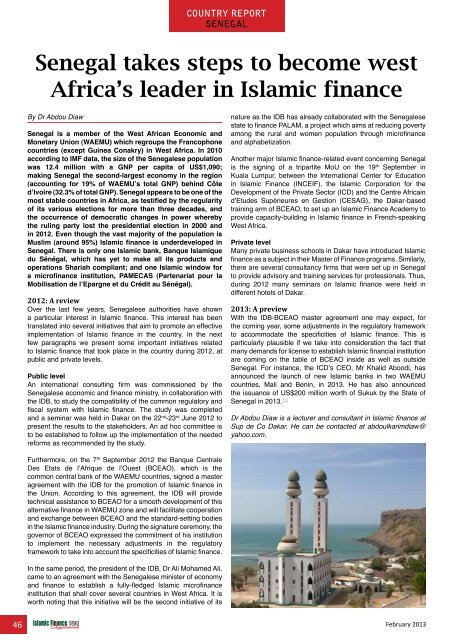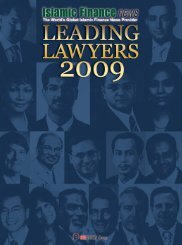View PDF Edition - Islamic Finance News
View PDF Edition - Islamic Finance News
View PDF Edition - Islamic Finance News
You also want an ePaper? Increase the reach of your titles
YUMPU automatically turns print PDFs into web optimized ePapers that Google loves.
country report<br />
Senegal<br />
Senegal takes steps to become west<br />
Africa’s leader in <strong>Islamic</strong> finance<br />
By Dr Abdou Diaw<br />
Senegal is a member of the West African Economic and<br />
Monetary Union (WAEMU) which regroups the Francophone<br />
countries (except Guinea Conakry) in West Africa. In 2010<br />
according to IMF data, the size of the Senegalese population<br />
was 12.4 million with a GNP per capita of US$1,090;<br />
making Senegal the second-largest economy in the region<br />
(accounting for 19% of WAEMU’s total GNP) behind Côte<br />
d’Ivoire (32.3% of total GNP). Senegal appears to be one of the<br />
most stable countries in Africa, as testified by the regularity<br />
of its various elections for more than three decades, and<br />
the occurrence of democratic changes in power whereby<br />
the ruling party lost the presidential election in 2000 and<br />
in 2012. Even though the vast majority of the population is<br />
Muslim (around 95%) <strong>Islamic</strong> finance is underdeveloped in<br />
Senegal. There is only one <strong>Islamic</strong> bank, Banque Islamique<br />
du Sénégal, which has yet to make all its products and<br />
operations Shariah compliant; and one <strong>Islamic</strong> window for<br />
a microfinance institution, PAMECAS (Partenariat pour la<br />
Mobilisation de l’Epargne et du Crédit au Sénégal).<br />
2012: A review<br />
Over the last few years, Senegalese authorities have shown<br />
a particular interest in <strong>Islamic</strong> finance. This interest has been<br />
translated into several initiatives that aim to promote an effective<br />
implementation of <strong>Islamic</strong> finance in the country. In the next<br />
few paragraphs we present some important initiatives related<br />
to <strong>Islamic</strong> finance that took place in the country during 2012, at<br />
public and private levels.<br />
Public level<br />
An international consulting firm was commissioned by the<br />
Senegalese economic and finance ministry, in collaboration with<br />
the IDB, to study the compatibility of the common regulatory and<br />
fiscal system with <strong>Islamic</strong> finance. The study was completed<br />
and a seminar was held in Dakar on the 22 nd -23 rd June 2012 to<br />
present the results to the stakeholders. An ad hoc committee is<br />
to be established to follow up the implementation of the needed<br />
reforms as recommended by the study.<br />
nature as the IDB has already collaborated with the Senegalese<br />
state to finance PALAM, a project which aims at reducing poverty<br />
among the rural and women population through microfinance<br />
and alphabetization.<br />
Another major <strong>Islamic</strong> finance-related event concerning Senegal<br />
is the signing of a tripartite MoU on the 19 th September in<br />
Kuala Lumpur, between the International Center for Education<br />
in <strong>Islamic</strong> <strong>Finance</strong> (INCEIF), the <strong>Islamic</strong> Corporation for the<br />
Development of the Private Sector (ICD) and the Centre Africain<br />
d’Etudes Supérieures en Gestion (CESAG), the Dakar-based<br />
training arm of BCEAO, to set up an <strong>Islamic</strong> <strong>Finance</strong> Academy to<br />
provide capacity-building in <strong>Islamic</strong> finance in French-speaking<br />
West Africa.<br />
Private level<br />
Many private business schools in Dakar have introduced <strong>Islamic</strong><br />
finance as a subject in their Master of <strong>Finance</strong> programs. Similarly,<br />
there are several consultancy firms that were set up in Senegal<br />
to provide advisory and training services for professionals. Thus,<br />
during 2012 many seminars on <strong>Islamic</strong> finance were held in<br />
different hotels of Dakar.<br />
2013: A preview<br />
With the IDB-BCEAO master agreement one may expect, for<br />
the coming year, some adjustments in the regulatory framework<br />
to accommodate the specificities of <strong>Islamic</strong> finance. This is<br />
particularly plausible if we take into consideration the fact that<br />
many demands for license to establish <strong>Islamic</strong> financial institution<br />
are coming on the table of BCEAO inside as well as outside<br />
Senegal. For instance, the ICD’s CEO, Mr Khalid Aboodi, has<br />
announced the launch of new <strong>Islamic</strong> banks in two WAEMU<br />
countries, Mali and Benin, in 2013. He has also announced<br />
the issuance of US$200 million worth of Sukuk by the State of<br />
consulting www.<strong>Islamic</strong><strong>Finance</strong>Consulting.com<br />
www.<strong>Islamic</strong><strong>Finance</strong>Events.com<br />
Senegal in 2013.<br />
www.<strong>Islamic</strong><strong>Finance</strong><strong>News</strong>.com<br />
www.<strong>Islamic</strong><strong>Finance</strong>Training.com<br />
www.MIFforum.com<br />
www.MIFmonthly.com<br />
www.MIFtraining.com<br />
www.REDmoneyBooks.com<br />
Dr Abdou Diaw is a lecturer and consultant in <strong>Islamic</strong> finance at<br />
Sup de Co Dakar. He can be contacted at abdoulkarimdiaw@<br />
yahoo.com.<br />
Furthermore, on the 7 th September 2012 the Banque Centrale<br />
Des Etats de l’Afrique de l’Ouest (BCEAO), which is the<br />
common central bank of the WAEMU countries, signed a master<br />
agreement with the IDB for the promotion of <strong>Islamic</strong> finance in<br />
the Union. According to this agreement, the IDB will provide<br />
technical assistance to BCEAO for a smooth development of this<br />
alternative finance in WAEMU zone and will facilitate cooperation<br />
and exchange between BCEAO and the standard-setting bodies<br />
in the <strong>Islamic</strong> finance industry. During the signature ceremony, the<br />
governor of BCEAO expressed the commitment of his institution<br />
to implement the necessary adjustments in the regulatory<br />
framework to take into account the specificities of <strong>Islamic</strong> finance.<br />
In the same period, the president of the IDB, Dr Ali Mohamed Ali,<br />
came to an agreement with the Senegalese minister of economy<br />
and finance to establish a fully-fledged <strong>Islamic</strong> microfinance<br />
institution that shall cover several countries in West Africa. It is<br />
worth noting that this initiative will be the second initiative of its<br />
46 February 2013
















